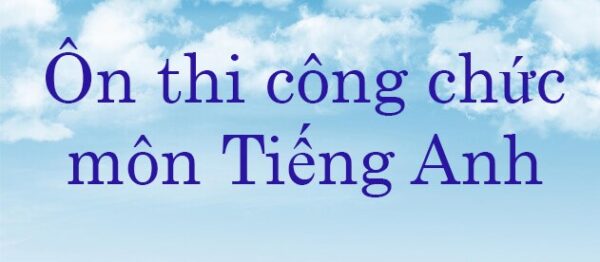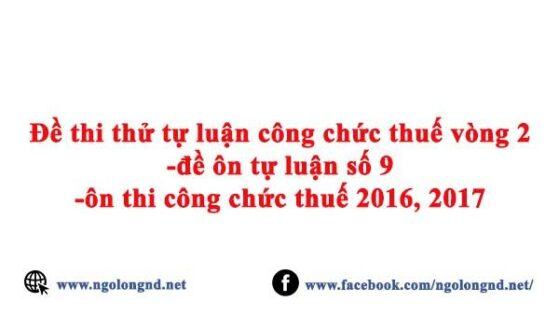Đề thi thử môn tiếng Anh ôn thi công chức Thuế – Kho bạc – Hải quan có đáp án.

1. She has to do a…………of washing every day.
A. many
B. few
C. lot
D. much
2. His telephone doesn’t work and mine doesn’t…………
A. too
B. neither
C. so
D. either
3. We aren’t rich enough…………that car.
A. not buy
B. to buy
C. for buying
D. can’t buy
4. It began to rain while we…………soundly.
A. slept
B. were sleeping
C. have slept
D. are sleeping.
5. I saw him …………9:30 …………a party ………… Saturday.
A. in/at/at
B. at/at/at
C. on/ in/ at
D. at/ at/ on
6. On his way home, John usually…………at the post office.
A. stops
B. stop
C. to stop
D. stopped
7. Mary and…………would like to join the English speaking club.
A. me
B. my
C. mine
D. I
8. My brother is very…………of music.
A. like
B. fond
C. interested
D. enjoyed
9. You needn’t do that when the maid is here, …………?
A. do you
B. need you
C. is she
D. isn’t she
10. Mr. Brown…………his children to school every day.
A. carries
B. brings
C. takes
D. picks
11. It was nice…………you to help us.
A. of
B. to
C. about
D. from
12. One of my friends advised me …………to an American dinner without bringing anything.
A. not go
B. not to going
C. not to go
D. not going
13. In this cold climate, trees can’t…………
A. grow
B. bring up
C. mature
D. continue
14. Mathematics …………a difficult subject.
A. are
B. is
C. have
D. has
15. Which word is incorrect?
A. proofs
B. thiefs
C. chefs
D. cuffs
16. Michal has waited ………………….. the bus stop for over two hours.
A. for
B. on
C. at
D. in
17. Although I admire his comedies, I can’t agree that they are better than his plays.
A. Despite of admiring his comedies, I can’t agree that they are better than his plays.
B. In spite of admiring his comedies, I can’t agree that they are better than his plays.
C. In spite to admiring his comedies, I can’t agree that they are better than his plays.
D. In spite admiring his comedies, I can’t agree that they are better than his plays.
18. ………….. did you go to the library? To get a book.
A. why
B. when
C. how
D. how often
19. We are all…………… by the play.
A. disappointing
B. disappointed
C. disappoint
D. to disappoint
20. Dr. Clark,……………………..I hadn’t seen before, entered the room.
A. whom
B. whose
C. who
D. that
For thousands of years tobacco was (21)__________ by the American Indians
with no oil – effect. In the 16th century it was (22)__________ to Europe. This early
tobacco was mixed with soil and rather dirty. It was chewed or smoked in pipes only by
men; women thought it was smelly and (23)__________. It was first (24)__________ in
America in the 17th century on slave plantations. In the 18th new technology refined
tobacco and the first cigarettes (25)__________ produced.
21.
A. used
B. using
C. to use
D. use
22.
A. bring
B. brought
C. brings
D. bringing
23.
A. disgust
B. disgusted
C. disgusting
D. disgustedly
24.
A. grow
B. growing
C. grows
D. grown
25.
A. is
B. are
C. was
D. were
Walt Whitman, born in New York, in 1819, was one of America’s unusual
literary figures. As an individualist, he rambled through the countryside seeing people 
and places, and making them his own. His experiences in earning a living were varied;
at times he was a printer, a teacher, a carpenter, a nurse and a newspaper editor. He was
a big-hearted man, open and accepting. He gave freely of his time by caring for the
wounded during the Civil War. Though he lived in the city, he often spent time in the
country, developing his strong sense of nature, which carried throughout his poems. In
1855 he collected the verses he had written, and published them in one thin volume,
“Leaves of Grass”, a book which he revised and rewrote all the rest of his life. The book
was ridiculed by some poets and generally ignored by others, probably because his
verse forms were not traditional. He had felt that it was necessary to achieve a new
poetic form in order to communicate his views. His reputation didn’t grow until after
his death, and it reached a high point in the 1920s. Since then, Whitman’s style has
greatly influenced modern poets.
26. The best title for this passage is ……..
A. Leaves of Grass
B. A Country Man
C. Walt Whitman
D. Poetry: A new Form
27. Whitman’s big-heartedness is shown by his ………
A. visiting the countryside
B. being an individualist
C. rewriting “Leaves of Grass”
D. caring for the wounded
28. The passage says that during Whitman’s life -time, other poets ……..
A. accepted him
B. communicated with him
C. praised him
D. laughed at him
29. We can assume that Whitman was ignored because he ……..
A. wrote in a new form
B. ramble through the countryside
C. published his poems
D. rewrote his book
30. The word “rambled” is most similar to the meaning of ……..
A. stopped briefly
B. walked slowly
C. traveled quickly
D. marched excitedly









